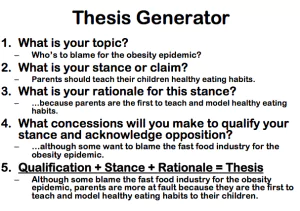 Creating a successful piece of academic writing is impossible without a properly composed thesis statement. A thesis statement is a sentence or two that clearly introduces the main point of your piece of writing, its central message. A thesis statement comments on your position in regard to your chosen topic, and helps your readers keep track of your arguments.
Creating a successful piece of academic writing is impossible without a properly composed thesis statement. A thesis statement is a sentence or two that clearly introduces the main point of your piece of writing, its central message. A thesis statement comments on your position in regard to your chosen topic, and helps your readers keep track of your arguments.

JOIN OUR LEARNING HUB
✅ AI Essay Writer ✅ AI Detector ✅ Plagchecker ✅ Paraphraser
✅ Summarizer ✅ Citation Generator
✅ AI Essay Writer ✅ AI Detector ✅ Plagchecker ✅ Paraphraser
✅ Summarizer ✅ Citation Generator

Looking for help with how to write a thesis statement? Check this TOP-10 list of websites where you can get professional assistance and guidance
Steps for Writing a Thesis Statement
- Explore your subject and narrow it down. A strong thesis statement cannot be vague—it must contain the essence of your topic.
- Paraphrase your topic in the form of a simple question. The answer to this question will most likely become your thesis.
- Once you think your thesis statement is working, analyze and evaluate it. Make sure it refers strictly to a single issue, reflects exactly what you want to say in your paper, and covers at least three areas of discussion.
- Write your thesis statement down. Usually, it is located in the middle or at the end of an introductory paragraph; the reason why a thesis is usually placed there is that it helps the writer engage readers into the set arguments from the beginning.
Techniques for Composing a Thesis Statement
One of the main problems students face is having no idea about where to start from. Composing a thesis statement may be tricky, but certain approaches exist which can give a writer some starting ground. Some of these techniques are listed below:
- Determining the purpose of the paper. Decide what the purpose of your paper is, and it can be later developed into a thesis statement.
- Summarizing. After you have comprehended material on your subject, you can try to briefly retell its essence. Do it a couple of times, reducing and compressing your summary more and more, and finally what is left will be the main idea of your essay.
- Turn your assignment guidelines upside down. If your assignment refers to a specific question, restate it in a form of an assertion.
- Expressing an opinion. Before starting to work on the thesis statement, express your opinion on the subject without worrying about supporting it with evidence—this can be done later. You aren’t supposed to create a strongly-argued thesis statement immediately.
Key Points to Consider
- To some extent, a thesis statement is similar to an opinion. However, there is a major difference between them. While an opinion is more about thinking this or that way, a thesis statement implies that the claim you offer to the reader has been thoroughly studied and is supported with evidence.
- Your thesis statement may change while working on a paper. Therefore, don’t treat your initial thesis statement as absolute; make it a working one, so that you can revise and correct it later, if needed.
- A thesis statement is meant to serve as a specific road map for your whole paper, since it determines its main idea, its structure, and arguments you will refer to while writing. A strong thesis statement is also debatable, which implies that an opponent can reasonably argue an alternative position.
- A thesis statement must show your conclusions in regard to a subject. It is important to remember that a thesis statement isn’t simply a fuse for further writing; on the contrary, it is a result of your explorations in your chosen subject, a summary.
Do and Don’t
Do
|
Don’t
|
Common Mistakes
- Choosing a thesis statement that is not appropriate in terms of the required length of the paper. No matter how talented you are, you can hardly disclose all the reasons of a Middle East war conflict in a one-page essay.
- Using quotations. Though it may seem like a sound idea, a quotation shows that the thought you express in your thesis does not belong to you.
- Using a lot of meaningful-sounding words and phrases, but expressing nothing.
- Expressing a point of view that doesn’t belong to you. Your opinion may not be original, and most likely it has already been thought of. However, people cannot think identically, and if you simply restate the assertions of your predecessors, it will be rather noticeable.
Follow us on Reddit for more insights and updates.
Samples for Writing a Thesis Statement
Development of a Thesis Statement (English Course) Essay Sample, Example
Assignment Details
Course: English 456: American Literature: Study of Emily Dickinson's Poetry
Write an essay about the most influential aspect of Dick...
Thesis Statement Examples for Different Types of Essays Essay Sample, Example
Cause and Effect
Though initial psychological trauma may have negative effects on the development of a personality, most emotional suffering inflicted during th...


Comments (0)
Welcome to A*Help comments!
We’re all about debate and discussion at A*Help.
We value the diverse opinions of users, so you may find points of view that you don’t agree with. And that’s cool. However, there are certain things we’re not OK with: attempts to manipulate our data in any way, for example, or the posting of discriminative, offensive, hateful, or disparaging material.
Comments are closed.